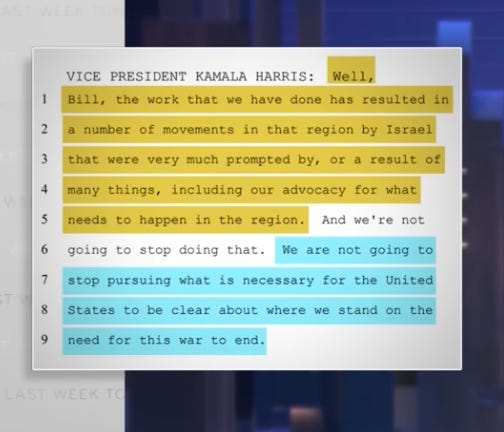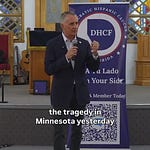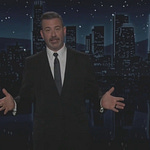Interviews are an essential part of journalism. I did several for this article. None of those five interviews will be replicated here in their entirety. Instead, in typical journalism fashion, I’ll edit the interviews, picking select portions to include alongside other information I have gathered from credible sources.
That’s what the journalists at CBS News did with the Kamala Harris pre-election interview. It’s what journalists do everyday in newsrooms across the county. Editing is a routine, respected practice: reporters collect information, then guided by experience and journalism standards and practices, put a story together to share with the audience. Sometimes those choices are impacted by time considerations. Digital outlets often want articles that are 800 words; TV news prefers video stories that run two-minutes or less; live broadcast interviews typically have five-minute slots.
As a former television newscast producer, I can also tell you that sometimes editing is impacted by the need for variety. When I produced a 5 p.m. newscast in Chicago, I made a point of using a different clip from a high profile interview than the clips that aired on the newscasts on either side of mine. No critical facts were left out of the three versions of the same story, each show producer was simply looking for variety.
Willie Chriesman, a longtime cable and local news producer, knows the process well. He told me:
“The goal was always to be able to differentiate the content of one program from another and not be repetitious for the viewer. This was especially important if you were producing content for newscasts that ran closely together, such as for a 5:00 and a 6:00. It was also true of my days at CNN when the basics of a story may run from hour to hour.”
Something similar can happen when a news outlet has a big story or interview that it wants to promote. In that case, shorter snippets are played on one show to preview the entire interview or story segment that’s slated for a different program on the same network. That’s clearly what happened with the Harris interview. One CBS program — Face the Nation — played an excerpt to promote the complete interview airing later that same day on a different CBS program (60 Minutes). This is normal practice, not nefarious and certainly not election interference as Trump has claimed.
For nefarious editing, look to Fox. That propaganda network is famous for manipulating content to Trump’s benefit like here with his comments about the Epstein files. NPR’s media reporter David Folkenflik said, “These cuts by Fox in Trump interview on Epstein are more substantively consequential than those cited in Trump's lawsuit against CBS (which basically included Harris's full answer across two shows).”

Journalism Pros Weigh In
Former ABC News correspondent Chris Bury says:
“All news networks, including Fox News, routinely air different video clips from longer interviews. It is standard practice. At Nightline, for example, we would air brief and punchy clips in the open to the program and play longer versions in the body of the full news report. There is nothing unusual or misleading about that common practice.”
Broadcast journalist Sharon Van Zwieten agrees:
“At CNN for example, if an anchor got a key interview, the choicest bites were kept for that person's show and other bites were parceled out by editorial supervisors and sometimes even negotiated among executive producers. This happens because news is a business. Just like the President picks the portraits he thinks will sell T-shirts, news executives parse soundbites to attract and retain viewers. And the standards remained high in the process. At every news organization I worked for, journalists would have been suspended or fired for misusing sound …”
Former CBS News producer Bruce Rheins notes that CBS’ standards and practices handbook expressly forbids manipulating content: “you could only edit it for length within the answer itself.”
He adds:
Almost every piece I produced for the CBS Evening News would be updated and repurposed for the following morning's CBS This Morning or Early Show, whatever they were calling it at the time; we usually picked a different bite (a little shorter if possible) from a standing interview from the original piece. Also, in features that were EXPANDED for Sunday Morning, we had the luxury of using longer bites, if warranted. This not only occurs as a matter of course in network news, but also in every local newsroom I ever worked in or visited; it is COMMON PRACTICE, and happens ALL THE TIME, with no change in the soundbite's or piece's point of meaning.”
Editing interviews is obviously not unique to broadcast news. Print and digital reporters also carefully select the portions of interviews to include within stories or highlight in social media posts and other blurbs. Look at any story on the Wired homepage. You’ll find sources quoted but not the entire unedited transcript of those individual conversations. Nor will you find the reporter's notes. Maybe Trump will come for those next?
Let’s Go to the Videotape
Trump’s political witch hunt did result in CBS making public all of its raw footage of the Harris interview. The footage was also posted online with this comment: “We are posting the same transcripts and videos of our interview with Vice President Kamala Harris that we provided to the FCC. They show — consistent with 60 Minutes' repeated assurances to the public — that the 60 Minutes broadcast was not doctored or deceitful.“
Honestly, it’s pretty boring stuff to see how the sausage is made. Watch and you’ll see a reporter asking a presidential candidate questions. That’s it. There’s no sign whatsoever of questionable journalism practices. Nor is there any when it comes to the editing of those answers. This graphic from Last Week Tonight with John Oliver shows the $16 million edit: The yellow section was broadcast on Face the Nation; the blue on 60 Minutes. It was routine news editing, not election subversion.
Many legal experts are worried about what this Paramount capitulation means for freedom of the press. Former Wisconsin U.S. Attorney Jim Santelle told me:
“Donald Trump alleges wrongdoing, which there is none, and he succeeds, and a court, again, the judge in this case, will have to sign off in this settlement, a court endorses the settlement that puts the imprimatur of the judiciary on this action. That is catastrophic for all of us, including the journalism world. There is no basis whatsoever under journalism law, as I understand it, certainly not under voter suppression law, voter influence law, election interference law, this is not that.
He added:
“Most importantly, the capacity of news agencies to be able to identify among long interviews those items that are relevant to a story and those that are not, that has been a fundamental notion that goes along with the First Amendment for time immemorial, and certainly in contemporary times.”
What’s Next?
This is only the latest in a string of setbacks for the idea of a free press. Mr. Trump has already kicked out some legacy news outlets and welcomed extremist news organizations to the press pool. Journalists who regularly pushed back on the president like Jim Acosta, Terry Moran, and Joy Reid have lost their high profile jobs. Major media companies like Facebook and news outlets like the Washington Post and L.A. Times have already bowed to Trump pressure, ending basic fact-checking and adding decidedly pro-Trump content.
All this raises truly frightening questions. Since Paramount’s settlement amounts to a full-on retreat from its First Amendment rights, what will follow? There are reports that the new owner is planning to move CBS away from its traditional fact-based journalism, and towards a pro-Trump stance. (Sound familiar?) Will other news outlets also pull back from more aggressive critique of Trump? Will the president come after other routine journalism practices like journalists' choice of interview subjects or the placement of news content on a home page? One thing is certain: The assault on mainstream media will continue and all of us are paying the price.
Jennifer Schulze is a longtime Chicago journalist. She’s on Bluesky @newsjennifer.bsky.social and Substack at “Indistinct Chatter.” Read the original column here.












